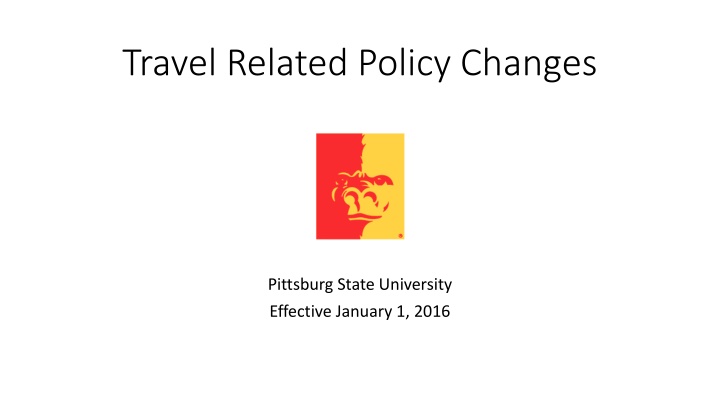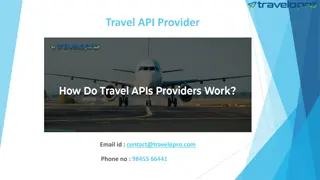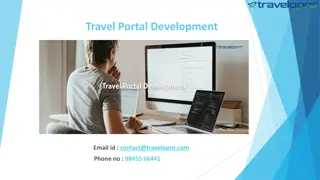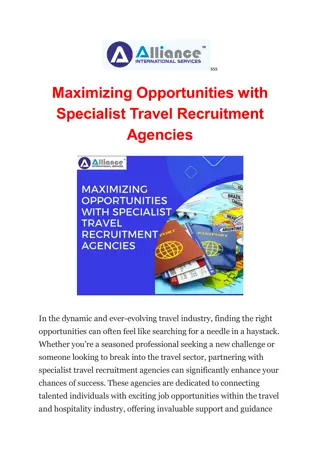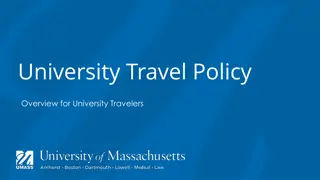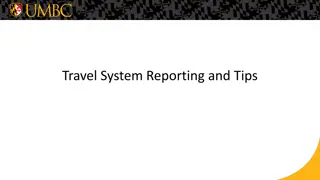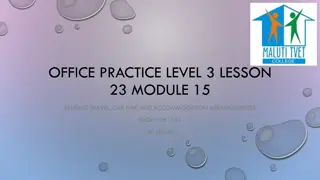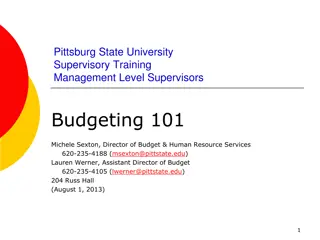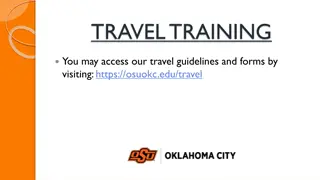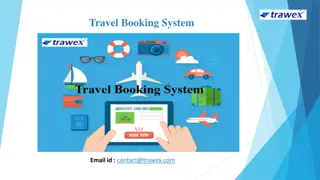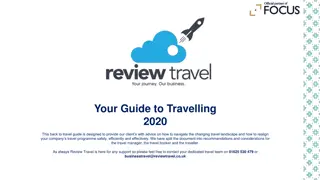Travel Policy Changes at Pittsburg State University
Pittsburg State University is implementing new travel policy changes effective January 1, 2016, aligning with federal standards for per diem rates. The changes are a result of the State of Kansas adopting federal rates and will impact all travel occurring after the specified date. The policy update is in response to an upgrade to the State of Kansas Accounting System, aiming to streamline out-of-state reimbursements and improve the accuracy and relevance of federal rates. While the new policy offers benefits such as aligning reimbursements with actual travel locations and updating rates twice a year, it also poses challenges in manual processing due to its complexity.
Download Presentation

Please find below an Image/Link to download the presentation.
The content on the website is provided AS IS for your information and personal use only. It may not be sold, licensed, or shared on other websites without obtaining consent from the author.If you encounter any issues during the download, it is possible that the publisher has removed the file from their server.
You are allowed to download the files provided on this website for personal or commercial use, subject to the condition that they are used lawfully. All files are the property of their respective owners.
The content on the website is provided AS IS for your information and personal use only. It may not be sold, licensed, or shared on other websites without obtaining consent from the author.
E N D
Presentation Transcript
Travel Related Policy Changes Pittsburg State University Effective January 1, 2016
This is something new for everyone at PSU Please be patient as we all learn this new process. It is new to us too! We will have examples and a Q&A session at the end of the presentation. Please hold questions until the end of the presentation. We realize there are many unique situations regarding travel on our campus. If we are not able to answer your specific question(s) today, we will find out for you. Once we have the answer we will update the Q&A on the Business Office website. We have provided a card for your question, name, and contact information.
How did this all come about? Informational Circular 16-A-006 Travel Related Policy Changes State Agencies received Informational Circular 16-A-006 on October 12, 2015 notifying them that the State of Kansas will adopt federal standards for per diem rates. The policies listed below are being implemented for all travel occurring on and after January 1, 2016. Circulars: 16-A-006 Travel Related Policy Changes 16-A-010 Travel Related Policy Changes (Supercedes 16-A-006) 16-A-011 FY 2016 Subsistence Rates for Travel Occurring on and after 1/1/16
The State of Kansas is adopting federal rates. What are those rates? We are not adopting their policies, only their rates. CONUS stands for CONtinental United States. Federal General Services Administration is responsible for maintaining the Contiguous State Rates. This applies to all of the Continental United States and Washington D.C., with the exception of Alaska, Hawaii, and U.S. Territories. Website: http://www.gsa.gov/portal/content/104877 OCONUS stands for Outside the CONtiguous United States. OCONUS rates are established by the Department of Defense and include Alaska, Hawaii, and U.S. Territories. Website: http://www.defensetravel.dod.mil/site/perdiemCalc.cfm International Travel meal reimbursement will follow the U.S. Department of State M&IE rates. The option to use actual meal receipts has been discontinued. (Note this does not include lodging) Website: https://aoprals.state.gov/web920/per_diem.asp
We already had a travel policy in place. Why change? SMART (State of Kansas Accounting System) was updated in November. As a result of that upgrade these travel policy changes were made and this policy utilizes the functionality of that upgrade. Although PSU has no automated travel system, we are still required to follow state policy. The Good News Out-of-state reimbursements align closer with actual travel locations. Once implemented the Federal rates will be updated twice a year on October 1 and April 1, so rates are continuously relevant. Travelers will now receive a meal on the quarter they leave AND the quarter they return. The Bad News The complex policy is more difficult to manage in a manual process.
What has changed? Subsistence Meal Per Diem Calculation and Rates Lodging Limits and Rates
M&IE Rate Changes to Subsistence Policy Per Diem Per Diem rates for the State of Kansas shall consist of the following: o Meals and Incidentals Expense (M&IE) rate Meals the cost of meals, taxes, and tips. Incidentals Expense all fees and tips to hotel porters, bellhops, doormen, and maids. At this point, the only tips that will be allowed are transportation related. For International travel, the allowance for paying actual meal expenses with receipts is discontinued.
M&IE Rate Changes to Subsistence Policy Per Diem o Same Day Travel Meal Allowance For employees that qualify for a same-day travel meal allowance, the department will enter the appropriate amount to be reimbursed based on 15%, 35% or 50% (breakfast, lunch or dinner) of the daily M&IE rate. The meal is to be determined by the department.
M&IE Rate Changes to Subsistence Policy Per Diem o Reduced Meal Allowance for Meals Provided at No Cost to the Employee If meals are provided during a given travel day, the department will reduce the M&IE rate by the amount of the meal that was provided, based on 15%, 35% or 50% (breakfast, lunch or dinner) of the daily M&IE rate. For partial days, the quarter amount is calculated first and then the meal deduction % is applied. If all meals are provided for a day, the reduction to the M&IE rate will be 100% and there will be no allowance for incidentals expense reimbursed to the traveler.
Changes to Subsistence Policy Lodging Rates Lodging o Employees may be reimbursed for actual lodging expense incurred, not to exceed the maximum rate. (Federal rate + 50%) o Since incidental expenses are included in the M&IE rate, no additional incidentals may be claimed with lodging. o Taxes are paid in addition to this lodging rate. o For international travel, payment for actual lodging expense is allowed and not subject to rate limitations. Lodging incidentals, as mentioned above, are included in the M&IE rate and should not be included in addition to the lodging.
Lodging Changes to Subsistence Policy Lodging o Conference Lodging Agencies may authorize payment or reimbursement for actual lodging expenses when an employee is required or authorized to attend a conference, and the lodging rate exceeds the applicable lodging expense limitation. The department must provide the Business Office with conference materials and rates. These must be maintained with travel documentation.
Lodging Changes to Subsistence Policy Lodging o Exception to Lodging Expense Limitations K.S.A 75-3207a(f) provides that the daily lodging expense limitations established may be exceeded, upon approval by the agency head by the lesser of either: (1) an additional 50% of the applicable lodging expense limitation, or (2) the actual lodging expense incurred. These lodging limits continue to be applied to the lodging rate before taxes. Thus, the amount reimbursed or paid for lodging expenses may exceed the established lodging limitation by as much as the amount of associated taxes.
CONUS: http://www.gsa.gov/portal/content/104877 SR=Standard Rate: Applies to locations without specified rates. NSR=Nonstandard Rate: Applies to locations with a specific rate. CONtinental United States: Includes all of the Continental United States and Washington D.C., with the exception of Alaska, Hawaii, and U.S. Territories
OCONUS: http://www.defensetravel.dod.mil/site/perdiemCalc.cfm Outside the CONtiguous United States: Includes Alaska, Hawaii, and U.S. Territories U.S. Territories include: American Samoa Guam Northern Mariana Islands Puerto Rico U.S. Virgin Islands
U.S. Department of State: https://aoprals.state.gov/web920/per_diem.asp U.S. Department of State: Includes M&IE Rates for International Travel Does NOT include rates for lodging For international travel, only the October 1 and April 1 subsistence files should be used to locate the M&IE Rate.
Examples & Worksheets
Doing the Math for M&IE Rates Here is a chart showing the exact time for a quarter when determining the amount of meals due to a traveler for a partial day of travel: Here is a chart showing the reduction percentage applied to the M&IE rate when a meal is provided: Example: A state employee travels to a conference in Overland Park, KS. The M&IE rate amount for a full day is $64.00. On the day of departure, he leaves home at 10:00 am, and dinner is provided at the conference. The calculation of the employee s M&IE for that day is: Meals for three quarters since he left at 10:00 $64.00 x .75 = Less Per Diem Deduction for Dinner $48.00 x .50 = ($24.00) Total Meals $48.00 $24.00
Other Important Notes: The Employee Travel Expense Reimbursement Handbook is being updated to reflect these policy changes. Agencies will be notified when the revised Employee Travel Expense Reimbursement Handbook and Policy Manuals are available. We will disperse this information to the campus once we receive it. The Business Office will be updating the travel portion of their website to reflect the policy changes. We will also provide a new trifold with updated information. The DA-121 Form is not changing at this point in time. Please continue to enter the per diem rate for one date at a time rather than for a range of days on one line. Our Travel Form approval policy at PSU has not changed. (Teresa checking to see if T-Form can be changed.)
Frequently Asked Questions Q1: It was stated at the training that if an employee has all 3 meals provided in one day, that employee would not receive any meal reimbursement or the $5 incidental for that day. As stated in Informational Circular 16-A-006, the $5 incidental is for tips to hotel porters, bellhops, doormen and maids. Even though this employee has all 3 meals provided, they could still incur an incidental expense like a bellhop tip. Is there any way an employee could get reimbursed if they do? A1: No, there would be no other method of reimbursing the traveler for incidental expenses. Q2: If an employee incurs more incidental expenses in a day than the daily rate allows (i.e. $5), can they claim reimbursement for the additional incidentals? A2: There is no allowance for lodging incidentals in excess of $5 which is included with the M&IE rate. Q3: What if an employee tips a taxi driver or a shuttle? Is this considered part of the incidental amount in the daily M&IE rate the employee gets, or is it considered part of the taxi expense? A3: A tip for a taxi driver or shuttle is still considered part of the taxi or shuttle expense and is reimbursed as part of the taxi expense on the expense report. The incidental amount included in the daily M&IE rate is a lodging incidentals allowance for fees and tips to hotel porters, bellhops, doormen, and maids. Q4: It is now January, 2016 and I need to reimburse a traveler for December travel. Do I use old rates or new rates? A4: The travel reimbursement is based on the date of travel, so you will use the old rates for the December travel.
Q5: On the old policy, continental breakfasts did not count as a provided meal, but federal guidelines consider it a provided meal. What does the state consider a provided meal at a hotel or event? A5: The state is adopting federal rates but not federal policies. The state policy is not changing. As stated in section 4301 of the Employee Travel Expense Reimbursement Handbook, light continental breakfasts are not considered to be a provided meal. However, each agency is responsible for reducing meal allowances for other complimentary breakfasts. (Departmental call) Q6: For international travel, current travel policy allows for payment or reimbursement of actual lodging expenses incurred. Will this continue with the adoption of federal rates? A6: Yes, for international lodging, actual expenses will continue to be paid or reimbursed. M&IE associated with international travel will follow federal rates established by the U.S. Department of State. Remember earlier in the presentation when we talked about international meals? They cannot be reimbursed for actual expenses, however, lodging can. Q7: Regarding the inclusion of tax with the lodging rate, will foreign travel rates exclude all U.S. Territories (i.e. will the taxes/lodging fees paid in addition to the base rate apply to continental U.S., Alaska, Hawaii and U.S. territories)? A7: That is correct. Taxes are paid in addition to the base rate for the continental U.S., Alaska, Hawaii and U.S. territories and possessions. Q8: Will things change with travel when Oracle Cloud is implemented at PSU? A8: Although we will still be following state travel policies, the way you process travel will definitely change! Although it s too early to go into specifics, our hope and goal is that it will be much easier than what we are presenting today.
Bringing it All Together Q&A Contact Information Misty Button (mbutton@pittstate.edu) Ext 4150 Kim Wilson (kimberly.wilson@pittstate.edu) Ext 4168 Teresa Kolarik (tkolarik@pittstate.edu) Ext 4151 Christina Davis (cdavis@pittstate.edu) Ext 4159
